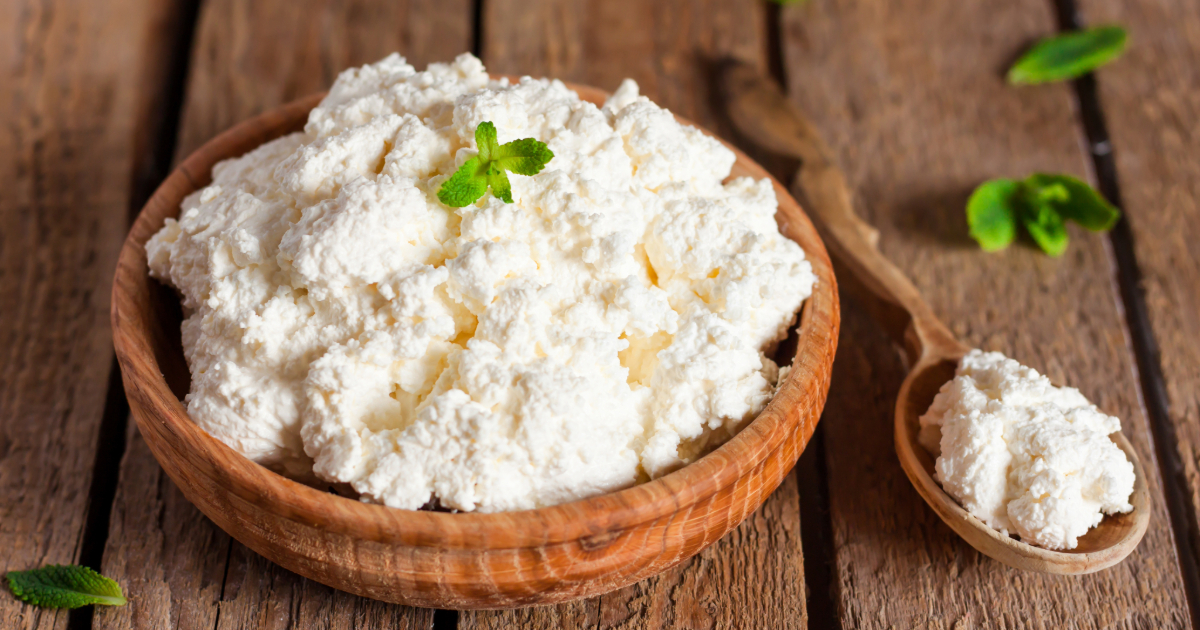Have you ever noticed farmers cheese or quark for sale in the dairy case and wondered what the difference is between them? Though they look similar, these fresh cheeses have some distinct differences in how they're made, their texture, uses, and more.

Farmers cheese and quark fall into the fresh cheese category, meaning they are unripened and unaged. Both ingredients are white, soft, and spreadable with a relatively mild flavor. But they originate from different food cultures and have their own unique production methods and textures.
How Farmers Cheese Is Made
Farmers cheese is a direct descendant of cottage cheese. To make it, cottage cheese curds are pressed to remove moisture. This yields a drier, sliceable cheese rather than soft curds.
The starting point is fresh cow's milk, often skim or low-fat milk. First, rennet and bacterial culture are added to promote acidification and separation of curds and whey. Once the curds form, they are drained of whey then washed before being pressed into blocks or wheels.
The key characteristic of farmers cheese compared to quark is that farmers cheese curds come from the cottage cheese making process. Removing more whey makes farmers cheese much drier and firmer than quark. It becomes dense enough to slice or crumble.
Some small additions like cream or salt may be worked into the pressed curd. But otherwise, minimal ingredients and steps go into making this fresh cheese. Because it is not aged, it has a very mild, milky flavor.
Key Takeaway: Farmers cheese is made by pressing moisture out of cottage cheese curds into a firm, sliceable block.
How Quark Cheese Is Made
Quark has a simpler make procedure more similar to yogurt than other cheeses. It relies almost entirely on bacterial cultures to thicken fresh milk into soft curds, without separating curds and whey.
To make quark, skim or whole milk is pasteurized then cooled. Mesophilic cultures are added which slowly acidify the milk to develop thick, soft curds. The milk can sit overnight or longer until it reaches the desired pH and thickness. Then it simply needs to be strained to reach the final fresh cheese consistency.
While a small amount of rennet is sometimes mixed in for commercial quark, traditionally none is used. The cultures do all the work of thickening creamier quark curds rather than separating curds and whey. With only light straining, a lot of moisture stays in the fresh curds resulting in quark's spreadable texture.
Key Takeaway: Quark is made by allowing bacteria cultures to naturally thicken milk into creamy soft curds without separating curds and whey.
Texture and Consistency Differences
The different production methods lead to major differences in texture between farmers cheese and quark.
Farmers cheese develops a dense, sliceable body from having more whey pressed out. It becomes firm enough to slice or crumble into pieces. The density provides a chewy texture closer to fresh mozzarella than other soft cheeses.
Quark has a creamy, scoopable texture since its soft curds retain more moisture. It spreads similarly to cream cheese or thick Greek yogurt. The high moisture content gives it a smooth, velvety mouthfeel without dryness. The soft curds break apart easily without chewiness.
| Farmers Cheese | Quark |
|---|---|
| Dense and sliceable | Soft and spreadable |
| Chewy texture | Velvety, creamy texture |
| Low moisture | High moisture |
So farmers cheese is firm and sliceable for eating by itself or crumbling over dishes, while quark has a scoopable consistency ideal for spreading onto bread. Their textures determine their best uses.
Flavor Differences Between the Cheeses
Since neither cheese is aged, both have mild and tangy flavors. But they differ slightly in taste due to variances from culturing methods.
Farmers cheese derives more flavor from the cottage cheese making process. The bacterial cultures create a mildly acidic, milky profile with a fresh, clean dairy flavor. It may have hints of buttermilk or yogurt tanginess.
Quark develops more sourness and fermented notes from the extensive culturing time. It tastes more like a tangy yogurt or soft sour cream, with gently sour and acidic tones. The fresh milk flavor still comes through along with the fermented tang.
So farmers cheese delivers clean, fresh dairy notes, while quark has more complexity from its long, slow culturing with dominant sourness. Both remain mild, however, compared to aged cheeses. Their fresh profiles let other ingredients shine when paired or incorporated into cooking.
Main Uses in Cooking and Baking
Thanks to their spreadable textures and mild flavors, both farmers cheese and quark work nicely in sweet and savory dishes. But their differing consistencies lend themselves to some specific uses more so than others.
Farmers cheese holds up well in baked goods thanks to its firm, dense texture. It can be layered into lasagnas or mixed into doughs without losing its structure. The cheese crumbles or cubes also deliver nice texture sprinkled over salads, grain bowls, flatbreads, and more without melting away.
Quark shines when used as a tangy, creamy condiment or smooth filling. Its velvety texture makes an excellent dip, spread, or dollop on savory dishes. It mixes seamlessly into batter-based baked goods bringing moisture and tang. Quark also makes light yet indulgent fillings for custards, tarts, sweet crepes, or stuffed rolls.
So farmers cheese chunks or shreds excel when added into all kinds of dishes while quark’s smooth body works great for spreading and mixing. Their textures guide which applications best allow their mild flavors to shine through.
Key Takeaway: Farmers cheese holds shape better for crumbling and baking while quark works well blended into batters or as a creamy condiment.
Availability Around the World
Since farmers cheese comes from an American cheesemaking tradition born out of the popularity of cottage cheese, it is much more common in the United States. Quark has stronger roots as a European fresh cheese, though it has growing artisan production in the U.S.
Farmers cheese was created to be an easier-to-handle form of cottage cheese. Today it is still a dairy case staple across America along with cottage cheese. Any region with a good selection of dairy products carries multiple brands of farmers cheese.
Quark originally hails from central European cultures like Germany, Poland, and Austria where it still frequently appears today. Over the past couple decades, small American creameries have expanded quark availability at domestic farmer’s markets and gourmet grocers. But most standard supermarkets still lack quark compared to farmers cheese.
So farmers cheese has a stronghold nationwide thanks to the broad cottage cheese market. Quark remains harder to find at regular stores but grows in small batch artisan production. Quark may one day catch on similarly to how Greek yogurt surged to mainstream popularity.
Key Takeaway: Farmers cheese has an established nationwide presence while quark is still an emerging niche cheese in America.
FAQs
What's the difference between quark, ricotta, and cottage cheese?
- Quark is made by fermenting milk solely with bacteria cultures while ricotta and cottage cheese rely more on rennet and acid addition to coagulate and curd the milk.
- Ricotta and cottage cheese both go through a process of separating large curds from liquid whey. Quark strains out some whey but doesn't form distinct curds.
- The curds make cottage cheese and ricotta more coarse and grainy compared to quark's smooth, creamy body.
Is farmers cheese and quark good options for a low-fat diet?
Yes! Both cheeses are commonly produced in low-fat or nonfat styles. Their fresh, mild flavors retain well without the fat. Reduced fat farmers cheese has a firmer, more rubbery texture while low-fat quark remains spreadably soft.
Can you make quark or farmers cheese at home?
It's possible to DIY both cheeses at home without fancy equipment. Quark just requires milk, live cultures, and cheesecloth for straining once thickened. Farmers cheese starts by making cottage cheese and pressing the curds after draining. But shaping the firmer farmers cheese into blocks takes more handling.
Conclusion
Farmers cheese and quark make great alternatives to typical sliced and shredded cheeses thanks to their spreadable textures and mild tang.
Farmers cheese offers firm, chewy bits perfect for eating by itself or adding into warm dishes and baked goods.
Quark shines when used chilled as a creamy dip or condiment and blended into recipes needing moisture and tang.

